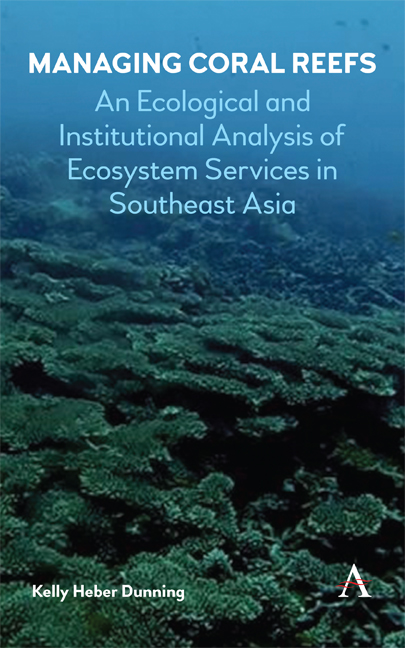 Managing Coral Reefs
Managing Coral Reefs Book contents
- Frontmatter
- Contents
- List of Figures
- List of Tables
- Acknowledgments
- List of Abbreviations
- 1 Introduction
- 2 Theory, Practice and Policy Context of Coral Reef Management
- 3 Governing Natural Resources in Indonesia and Malaysia
- 4 Case Study Sites and the Coral Triangle
- 5 Integrated Management of Marine Protected Areas
- 6 Legitimate Marine Protected Areas
- 7 Adaptive Capacity of Marine Protected Areas
- 8 Policy Recommendations for Marine Protected Area Management in Developing Countries
- Appendix A Research Design
- Appendix B Data and Methods
- Appendix C Coral Cover Results
- References
- Index
- Frontmatter
- Contents
- List of Figures
- List of Tables
- Acknowledgments
- List of Abbreviations
- 1 Introduction
- 2 Theory, Practice and Policy Context of Coral Reef Management
- 3 Governing Natural Resources in Indonesia and Malaysia
- 4 Case Study Sites and the Coral Triangle
- 5 Integrated Management of Marine Protected Areas
- 6 Legitimate Marine Protected Areas
- 7 Adaptive Capacity of Marine Protected Areas
- 8 Policy Recommendations for Marine Protected Area Management in Developing Countries
- Appendix A Research Design
- Appendix B Data and Methods
- Appendix C Coral Cover Results
- References
- Index
Summary
Reefs and People
The hum of diesel engines on the black volcanic beach in the village of Tukad mungga signals the start of the working day in a rural yet rapidly developing village on the prosperous resort island of Bali, Indonesia. Cows can be heard in pens behind houses while the seemingly unending construction of scenic beach villas dims the agricultural noise, a sign of rapid economic transition in the village. Women wrapped in traditional sarongs and sashes leave offerings on the beach: colorful fruit and flowers in small woven baskets with incense. Men get up from their plastic seats where they were drinking sweet, white coffee and smoking clove cigarettes in order to drag the traditional jukung boats, brightly painted narrow vessels with slim outriggers on each side, down the beach to the water. The oldest men are wearing udeng—Hindu traditional headscarves—as they finish their cigarettes, carry their engines and propellers, fasten them to their boats and welcome the tourists aboard (Figure 1.1). Many tourists, both Indonesians and foreigners, line up in orange life jackets to fill the jukungs. Many are here for snorkeling and the popular dolphin-watching tours, while others are here for diving.
Although all of these men own and operate the boats for their income, nobody is undercutting his neighbor. Nobody can be seen on the beach trying to recruit last-minute visitors to fill seats on their boats. For those who have visited more developed places on the Balinese tourist route, where you cannot take two steps without being asked to buy something, this is unusual. It appears that a very organized system of boat entry, as well as fixed set prices, exists. Also remarkable is how each boatman informs his guests to not touch the corals if they are snorkeling—not in perfect English, but the message gets across. When I ask these boatmen why they don't offer discounts in order to take the customers of the boatmen in the next village over, they cite their membership in a community-based organization, with colorful Balinese names that reference their Hindu religion and the importance of the sea.
- Type
- Chapter
- Information
- Managing Coral ReefsAn Ecological and Institutional Analysis of Ecosystem Services in Southeast Asia, pp. 1 - 10Publisher: Anthem PressPrint publication year: 2018


